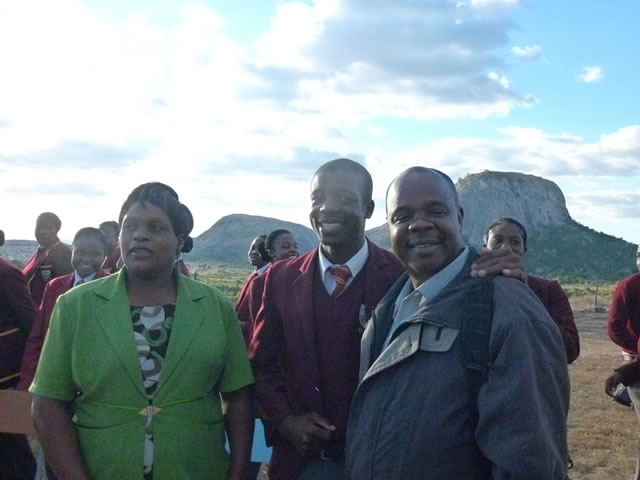‘Somewhere in this country’ in Murewa


Writer Memory Chirere (right) and Letwin Mabika an A’ Level literature teacher at Murewa High (left) and a student soon after the seminar
Beaven Tapureta
It is not often that ordinary readers of a book get to meet with its author in real life and converse.
Some Advanced Level literature students and their teachers from different high schools in and around Murewa had such a rare opportunity last week to meet and interact with Memory Chirere, a local author of one of their Advanced level set text “Somewhere in this country.”
Murewa High School, which initiated and hosted the mini-seminar, Cheunje High and Kambarami High spent the day with the author trying to critically dissect the collection of short stories. The setting was a short distance away from the serene, and mythical Hurungwe Hill and it was so reflective of the title and the hills on the book’s cover that the event potentially carried the somewhere-in-this-country spirit, in and outside the book.
Chirere gave the youngsters a rather rude awakening when he told them that it is not easy and not even right for an author to talk about his writing from a strictly critical point of view because the creative act is radically different from criticism. He however was ready to talk about these stories from a writer’s point of view in the hope that this helped in their criticism.
He also informed the students that when one publishes a story one loses control as it becomes open to various ways of reading.
His words were not to replace what their various teachers had taught them.
He stressed that it is important for students to come to terms with the fact that these were short stories and not a group of novels influenced by various things.
He then made the students understand what a short story is. He also gave them a comprehensive overview of the short story techniques that he employs in writing his stories such as “deliberate silences” (also known as understatement), deconstructive engagement, use of anti-heroes, mental/psychic engagements, and the use of intrigue and humour.
“In my stories I use deliberate silences. I don’t tell the whole story. I don’t over-elaborate because I want readers to participate in the creation of the story,” said Chirere. For instance, he said, the story “Keresenzia” does not tell where the girl’s parents are but it is clear they are dead.
Furthermore, it is not said what killed them and yet the absence of parents remain the driving force of the story.
Still with the story “Keresenzia”, Chirere told the students that his theory of deconstructive engagement comes out through an orphan who is not a victim as often expected in society but a victimiser as the orphaned girl kills her grandmother in a freak accident.
The author said that with the story “Maize”, he was setting out to write a love story that does not use a single love word throughout. The characters fall in love without uttering a single “I love-you” word but the readers should be able to discern it.
With the story “Suburb”, the author is working with an anti-hero, because the main character is not the usual able-bodied, well-dressed and well-known fellow with clear cut dreams.
In “Suburb”, an ordinary old man stops the bulldozers from destroying the houses in the squatter suburb.
The author stated that he has always been keen on the seeming little victories achieved by ordinary people because for him, this is where real struggles of life are.
“When these little victories are put together, they constitute the humanity,” said Chirere.
Characters in the collection “Somewhere in this country’ are normally seen to be playing mind-games with the reader and on one another and this is what the author deliberately created them to be.
“My stories are intentionally psychic. I want to get into the minds of my characters and bring out that they are both thinkers and actors. I want their internal struggles to come out as clearly as their actions,” Chirere said.
The students’ questions and comments clearly showed how analytically they had read “Somewhere in this country” before the seminar.
Ngonidzashe Nyabinde, a student from Kambarami High shared how he interpreted the short story “Tadamuhwa”, which is about a troublesome goat.
He split the name of the goat Tadamuhwa into two and translated them from their Shona meanings. “Tada”, he said, is a Shona word meaning “we have wanted’ and “muhwa/munzwa” is another Shona word meaning “thorn”.
Put together Tadamuhwa then simply becomes “we have wanted a thorn”.
Nyabinde excellently justified his interpretation using contextual points in the story, picking out characters that are “thorns” in the flesh of each other.
However, all were surprised when Chirere said Tadamuhwa is actually a Korekore word which means “we have been defeated” or in standard Shona, “tadyiwa”.
Another student from Murewa High asked why Chirere in “Somewhere in this Country” does not include other religions apart from African traditional religion. In response, Chirere said; “Writers do not write about everything they know in every single story.
“They also write about what they know. I would really struggle to write about the sea or snow. I have seen the sea and snow during visits to other countries but I don’t think that is my comfort zone. ”
Oliver Madondo noticed that Chirere uses humour even when he is writing about a serious or sad issue, for example, in the story “Tadamuhwa”.
“Well that is my chosen method. I believe that in jest you are more able to explore the world deeper. In Shona tradition we have sahwira or family friend whose role is to make you realise there is life beyond sadness and that life is not only understood from the serious side,” said Chirere.
The stories “Missy” and “Presidential Goggles” triggered lots of debate as students exchanged dissenting but healthy views on certain characters. For instance, in the story “Missy”, the students believed that the story happened soon after Zimbabwe’s independence when free education was introduced and therefore boys who went to school during that time were much older.
This was to dispute the point that the boy in the story could not be young and they gave reasons for their claim. Chirere said the character is actually a young boy and they (the students) must not second-guess young boys.
A variety of questions were asked and Chirere made sure he answered them completely and occasionally gave the students “triggers” to provoke them to think and look for answers on their own from the text.
Well known poet Tinashe “Mutumwapavi” Muchuri was part of the event and he inspired the students with poetic ice-breakers. Mutumwapavi performed his “sing-along” poems “Ibhinya” and “Kudada Huziva”.
Speaking after the seminar, Head of the English Department at Murewa High, Clifford Chiringa said he was happy with the knowledge the students had gained.
“Now that Zimsec seem to be embracing local literature, we must make effort to invite authors as part of our resources.
“I have been impressed as I am also an Advanced Level examiner for the paper which includes ‘Somewhere in This Country’.
Kelly Tsoka from Kambarami High said she had problem with interpreting literary text but she now felt equipped and know that there are various interpretations of a single text.










Comments